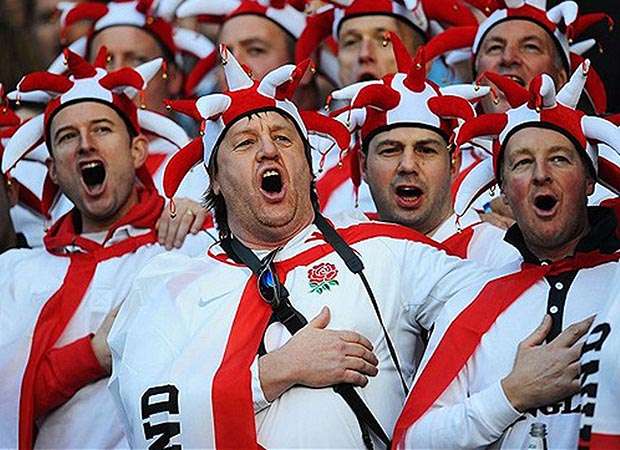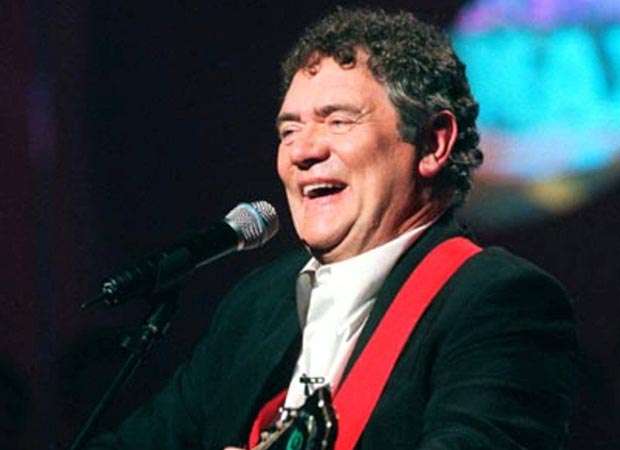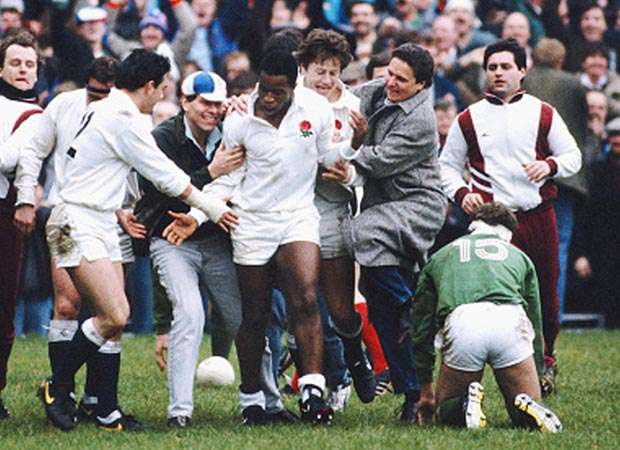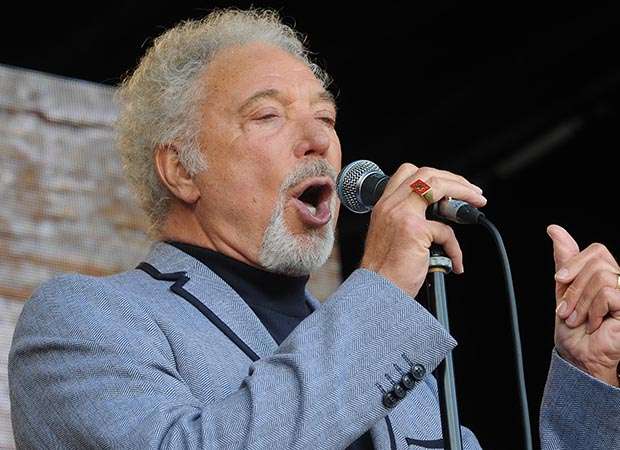 We are slap bang in the middle of the rugby anthems season – official and unofficial – but where do they come from, why do they get adopted and what do they say about those singing and the team they support?
We are slap bang in the middle of the rugby anthems season – official and unofficial – but where do they come from, why do they get adopted and what do they say about those singing and the team they support?
And where’s the next good one coming from because they seem like a dying breed although I did bump into a bunch of manically thirsty
Georgian supporters at the World Cup who went through a full 20 minute repertoire of stonking rugby songs in their native tongue. That alone should get them admittance to the Six Nations surely?
We could do with them to liven up the scene. Time was you would stand shoulder to shoulder on steaming terraces from an hour before kick-off and sing as one. Now in the vast concrete bowls everybody has their own seat which they scurry into ten minutes before kick-off having arrived fresh foot from the hospitality of the ubiquitous Game zone. On a bad day it can seem like matches are attended by 80,000 strangers rather than a band of brothers
That doesn’t always make for good singing, nor do the megawatt stadium sound systems and inane half-time banter by wannabee DJs – as was, alas, the case at England‘s home games at the World Cup.
Still, to strike a more positive note, the Welsh certainly sounded in good voice in Cardiff on Friday night, a good warm-up for St David’s Day on Tuesday while I note that this Saturday is St Piran’s Day, the patron Saint of Cornwall where there is still a strong tradition of rugby songs. All power to their well lubricated elbows.
Wales have always been the trend setters. It started with Chapel and rousing hymns which all but the non-believers could sing from the cradle but then branched out into the delights of Max Boyce and Tom Jones
The Welsh national anthem Hen Wlad Fy Nhadau (Land of My Fathers) dates back to 1856 and is specifically a tribute to Wales rather than a hymn. It was adopted as the national anthem almost by public acclaim in 1905 when Triple Crown champions Wales needed something to counter the New Zealand haka which they had taken to performing before games on the 1905 tour.
The WRU secretary Tom Williams suggested that Wales captain Teddy Morgan lead the crowd in singing the anthem as a response, the first recorded instance of this happening in any sport.
It’s a glorious song but the competition is fierce with Cwm Rhonda (Bread of Heaven) and Calon Lan both clamouring to be sung. There was a time when Men of Harlech featured prominently but that seems to have dropped out of favour.
The variant with Wales is the rogue songs that get adopted for random reasons, the classic being Tom Jones’ Delilah a raucous snarling little tale of aggravated assault and possibly even murder that regularly attracts the attention of the PC brigade who want it banned. Yes, it is an odd choice but it just so damned singable And then there is the Max Boyce factor, the balladeer from Glynneath who bounced back from being knocked out of Opportunity Knocks in 1973 to record a best-selling album from a gig he held at Treorchy Rugby club.
 Boyce, above, became the unofficial voice of the Welsh fans during the glory years – the poet and choirmaster who stayed sober enough to commit it all to memory. Some of his songs were of their time – Pontypool Front Row and Scottish Trip – but the chorus of Hymns and Arias will be sung at Wales matches for ever more.
Boyce, above, became the unofficial voice of the Welsh fans during the glory years – the poet and choirmaster who stayed sober enough to commit it all to memory. Some of his songs were of their time – Pontypool Front Row and Scottish Trip – but the chorus of Hymns and Arias will be sung at Wales matches for ever more.
Don’t underestimate Boyce. His second album, We All Had Doctors’ Papers, which was recorded live at Pontarddulais RFC is to this day the only comedy album to reach No.1 in the UK album charts. Eat your heart out Billy Connolly, Pete and Dud, Tommy Cooper, the Two Ronnies, Jasper Carrot et al.
Ireland is a land of song and great musicians so it’s no surprise they have spawned some memorable rugby anthems although again there is no rhyme or reason as to why one song is adopted and others are not.
When I first started attending Five Nations games in Dublin the terrace refrains were pretty standard Irish pub fare. Molly Malone was the go-to song with occasional bursts of Danny Boy and Wild Rover but they seem to have disappeared completely. Now we have Fields of Athenry and Ireland’s Call while if you are down Munster way Stand up and Fight from Carmen is what gets Thomond Park rocking.
Fields of Athenry is frankly a mystery. It’s the saddest bloody song in the world. It’s all about famine, loss, deportation and families being split up for ever and a day. God knows how it became a rugby anthem. It was penned by Peter St John in the 1970s and was first picked up by the Celtic FC supporters, with their huge Irish contingent, in the late 1980s followed by the Ireland national football team at the 1990 World Cup.
It then went underground before being adopted by the Munster fans at Thomond Park, followed very quickly by Ireland supporters at Lansdowne Road. Melancholy in the extreme, it leaves many wanting to phone the Samaritans but has strangely become associated with the most vibrant 15 years or so in Munster and Ireland history.
Ireland’s Call, meanwhile, came from the perceived political necessity to recognise those Irish players and supporters from the North, an anthem that swears allegiance to four proud provinces of Ireland rather than the Republic. It was specifically commissioned by the IRFU from the multi-talented Derryman Phil Coulter who among other claims to fame wrote Eurovision winner Puppet on a String for Sandie Shaw and Congratulations by Cliff Richard.
The first time I heard it was on the afternoon before Ireland’s opening World Cup game in 1995 against New Zealand when Ireland manager Noel ‘Noisy’ Murphy finished the pre-match Press conference by distributing song sheets among the gathered Press and putting a tape into the ghetto blaster that had intriguingly sat on the top table for the duration. We were then invited to sing along and comment.
A chaotic rendition ensued before the tape snagged, a technical mishap that completely baffled Noisy. We were on deadline so offered polite approval and made our excuse and left. Initial impressions were actually not favourable but I quickly grew to enjoy Ireland’s Call.
Easy lyrics, strong sentiments and a tribal chant for the masses that doesn’t suffer too much when you shout loudly out of tune. It’s fashionable to deride Ireland’s Call but everybody knows the words and joins in despite themselves.
Stand up and Fight is another odd one but I’m blaming Brian O’Brien the amiable Munster and Ireland manager for so many years. Richard Harris used to insist that it was an occasional Friday night drinking song in the pubs of Limerick in the 60 and 70s but it only really kicked off in 1999 when O’Brien, helping Munster celebrate a first win in Ulster for years, gave a spirited rendition of the song in the main bar of the Europa Hotel in Belfast.
The rousing chorus in particular hit the spot for many of the Munster players who asked if they could adopt the song and have it played before the kick off at Thomond: You can see why:
Stand up and fight until you hear the bell,
Stand toe for toe, trade blow for blow.
Keep punching hard until you hear the bell,
That final bell, until you hear the bell.
Stand up and fight,
Stand up and fight like hell.
Meanwhile I’ve read many times that Swing Low Sweet Chariot made its rugby ‘debut’ in 1988 when England recovered from a first half of mind-numbing drudgery to score six second half tries and destroy Ireland. Chris Oti, below, bagged a hat-trick that day and Rory Underwood left vapour trails all over Twickenham.
This claim is utter nonsense as anybody who played rugby in the 1970s will testify. Swing Low was one of the first songs unfurled in the bar after a game or on the bus returning from school games.
 Regulars at the Middlesex Sevens, possibly the most ferocious and prolonged annual gargle the game has ever known, during the 70s will also recall that, in the hour or so between the semi-finals and final, the stadium announcer Peter Yarranton used to lead the 70,000 revellers in the equivalent of an ale house sing song. That session always included a massed version of Swing Low including hand actions.
Regulars at the Middlesex Sevens, possibly the most ferocious and prolonged annual gargle the game has ever known, during the 70s will also recall that, in the hour or so between the semi-finals and final, the stadium announcer Peter Yarranton used to lead the 70,000 revellers in the equivalent of an ale house sing song. That session always included a massed version of Swing Low including hand actions.
What actually happened on the terraces of Twickenham in the 1988 was in fact a rather drunken but well intentioned tribute and demonstration of solidarity, albeit wildly politically incorrect, to the hat-trick hero Chris Oti.
Much of the pre-match publicity had concentrated on Oti becoming the first black player to represent England. This was in fact incorrect. James ‘Darkie’ Peters, the son of a Jamaican Lion tamer, had played for England in 1906, but the crowd was in a mood to laud and praise Oti’s every move and when he delivered a hat-trick the only song that remotely applicable was Swing Low. Such was the carnage as England ran amok in that second half that I rather fancy one or two imbibers thought they were back at the Sevens as well.
It’s funny how these things develop. Firstly Swing Low came synonymous with England tries and triumph and was wheeled out in moments of celebration. Then it became a song of encouragement when England were struggling and on a couple of notable occasions it has even been used as a gesture of solidarity and wall of noise to drown out the haka before a game.
Up in Scotland O Flower of Scotland is a curious case. It was written in 1967 by Corries singer Roy Williamson, who used to play for Edinburgh Wanders, to rather belatedly celebrate the Scots victory over English troops at the Battle of Bannockburn in 1314.
Initially it made little impact although it always went down well at Corries gigs but its first rugby airing came on the 1974 Lions tour of South Africa when Scotland wing Billy Steele, a Corries fan who had a fine voice, used to sing it when the Scottish contingent were called upon to offer up a song on the long coach journeys.
It seemed to capture a defiant David v Goliath mood that resonated with all the Lions as they set out to make history and was soon adopted as the Tour anthem by the entire party. Nobody attempted to get out of the bus before a game until O Flower of Scotland had been completed.
In 1990 it was officially adopted as Scotland’s official pre-match anthem and played its part in stirring up the emotions of the day on March 17 1990 when David Sole’s Scotland sent Will Carling’s England back “ta think again” after their 13-7 Grand Slam win.
Since then it’s enjoyed a mixed Press. The early Corries recording I have is fairly upbeat and jaunty, a bit cocky and celebratory in fact, but the big stadium anthem version is often too slow and funereal and the crowd always seem out of time with the band or anthem singer. It is also a song that depends heavily on the emotion of the moment and, too often in recent years, Scottish rugby has been at a low ebb.
 The Sottish song – march – that always gives me good bumps is Highland Cathedral which the SRU tend to play when the Scotland team run out of the tunnel. Wow! What a piece of music, although bizarrely it was written by two German composers Ullrich Roever and Michael Korb for a Highlands Games being held in Germany in 1982.
The Sottish song – march – that always gives me good bumps is Highland Cathedral which the SRU tend to play when the Scotland team run out of the tunnel. Wow! What a piece of music, although bizarrely it was written by two German composers Ullrich Roever and Michael Korb for a Highlands Games being held in Germany in 1982.
I remember one time, before a France game, the SRU organised a once-in-a-decade gathering of all the pipe bands in the land, some 2,000 musicians in all. To hear that particular Tartan Army give Highland Cathedral the full Monty was a rare privilege.
For a nation steeped in music Italy have made a negligible contribution to the genre so far although you could argue they haven’t had much to sing about. At least their national anthem Il Canto degli Italiani is one of the catchier ditties.
Meanwhile the French have rather rested on the laurels as well, content in the knowledge that La Marseillaise will always feature in the top three of national anthems anywhere in the world.
The French do offer up occasional corrida chants and trumpet solos which non-Latin countries worldwide now ridiculously tape and play at regular intervals during their games to enhance the atmosphere. But, alas, none of those full blooded Basque songs the Biarritz faithful use to sing at those big Heineken Cup matches down there or in San Sebastien ever seem to have transferred north to Paris.
Away from the Six Nations scene The Power of Four, written by Neil Myers for the 2005 tour of New Zealand, never found favour and Wonderwall from Oasis is probably their unofficial anthem. Played before and after every match on the 1997 Tour – 13 games back then – it became ingrained in the psyche and although I can’t stand the bloody thing there was a certain undeniable droning Brit pack defiance about it.
Out in the Provinces, Cornwall have always led the way. Even today you can hear Going up Camborne Hill, Lil Lize (Little Eyes), Lamorna and Trelawny whenever there is a gathering.
These songs were never heard to better effect than on September 11, 2001, when Rick Rescorla, a chief security officer at the World Trade Centre in New York, but first and foremost a Hayle rugby man, helped evacuate over 2,000 employees of Morgan Stanley from the tottering second Tower.
To keep morale high he belted out his favourite Cornish rugby songs on his megaphone. Grateful survivors particularly remember Going Up Camborne Hill as he made his way up the stairs one final time.
Rescorla was last seen alive on the 10th floor shortly before it collapsed.

























